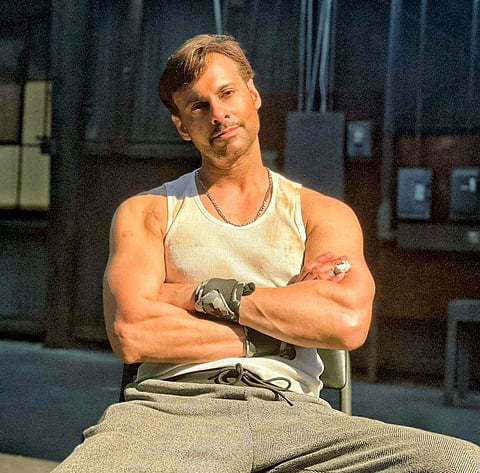
- LIFESTYLE
- FASHION
- FOOD
- ENTERTAINMENT
- EVENTS
- CULTURE
- VIDEOS
- WEB STORIES
- GALLERIES
- GADGETS
- CAR & BIKE
- SOCIETY
- TRAVEL
- NORTH EAST
- INDULGE CONNECT

Model-turned-actor Gautam Kapur has voyaged from the glamorous realm of fashion to the enthralling world of cinema, leaving an indelible mark on both. From his presence on the runway, Gautam’s transition to acting has been crowned with resounding success, notably exemplified by the critically acclaimed short film How Much Do You Want to Know? The film, a thought-provoking exploration of reincarnation and the interplay of past lives in the present showcases his exceptional ability to imbue his characters with profound emotional depth.
As the enigmatic Maulik, a former MMA fighter wrestling with recurring dreams, Gautam skillfully navigates the delicate balance between realism and performance. Immersed in his character’s complexities, he shares that the process was a journey into his own psyche, a reflection of his personal experiences woven intricately into the narrative’s fabric. Guided by innovative techniques and therapy, Gautam delved into the mind of his character, drawing from his own martial arts background to embody the nuances of a fighter's essence. Through silent introspection and immersion in past experiences, he harnessed a remarkable vulnerability, crafting a performance that resonates long after the credits roll.
Gautam’s choice to embrace roles characterised by psychological and introspective themes is driven by a profound connection to the human condition. In the piece, and beyond, he unearths the essence of existence, intertwining the complexities of ego, trauma, and the pursuit of inner peace. His embodiment of a character grappling with the hollowness of material success serves as a poignant reminder that even amidst luxury, the true journey lies within, a message that Gautam ardently communicates through his art. We speak to him to understand how he embraces the art of introspection, a practice that led him to confront his own past, while also illuminating his present.
Throughout your career how has this diverse creative journey shaped your understanding of the human experience, and how does it reflect in your work?
When you come from the fashion world, it teaches you how to express yourself. You gain a lot of confidence, learning how to walk, move and how to dress — a lot of self-expression. Now, stepping onto the film world, I think it is an extension of the fashion world. It is the fashion industry that is motivating. When you are already confident about the way you understand camera angles, it is an added advantage when you are a part of the film world as you have the confidence to emote your mind. It looks glamorous on the outside but you know deep inside that you cannot afford to make a mistake.
How do you navigate the fine line between realism and performance when immersing yourself in a character’s emotions?
Well, How Much Do You Want to Know was quite a learning process for me. It was close to my heart. The film is all about a fighter and how he goes into his past life. To emote the character’s nuances, I had to do a lot of guided tools and therapy. I used to go into silence thinking about the character and visualise myself as an MMA fighter and watch videos on MMA like UFC. I love the sport as I myself had been involved in martial arts. It involved a lot of passion and fitness. I was training with the best Japanese instructors. They have a beautiful character of silence in them. When I had to portray my character, I went back to all the experiences in my life: As a child, as a youngster, while I was thinking about what my character was like. I had to reflect on what had affected me personally and then put those pieces together with my character. The experience enhanced my creative instincts in a nutshell.
How do you personally connect with these themes, and how does it influence the choices you make as an actor?
My character has everything he wants. Money, luxury — you name it and he has it. But one thing that is constant even amidst the wealth is trauma. His wife leaves him and his career gets over. He starts seeking therapy. The message is simple. You could be famous, you could be rich. But it doesn’t mean that money can solve every problem in the world. The biggest problem is struggling to be at peace with yourself. My character is egoistic. He is a fighter. He has fame. But he seeks help because of bad dreams. He meets his unconventional therapist who specialises in past life regression and trauma. We want to convey that it’s okay if you have trauma and no sense of inner peace. But it is also fine to seek help and also to open people’s eyes to realising that there is something called inner healing. This is how it all came full circle.
Also read: 'Suicide Squad' director David Ayer says DCEU's final cut was not his version
How did you separate yourself from your character?
It’s like when I had to go into my past and introspect my experiences, I had to witness them. It was not easy. They say, if you cannot change your past, you cannot enjoy your present. So, with all the trauma and anger that came to me, I went into my childhood and understood a lot of things about myself. I used to close my eyes for about half an hour just to go back to my childhood. I remembered things I wouldn’t have remembered otherwise. I went back to my character — thought about him being killed in his past life. I used to note down points when I reflected on my past. In a way, it was like the art of fighting without fighting.
Now streaming online.
E-mail: chokita@newindianexpress.com
Twitter: @PaulChokita